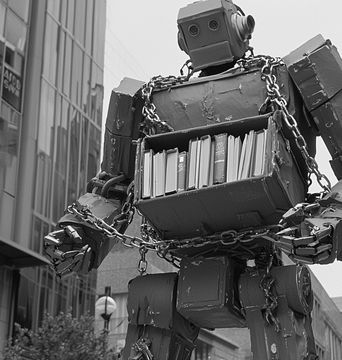PENGUIN RANDOM HOUSE CHANGES COPYRIGHT WORDING GLOBALLY TO DEFEND AUTHORS' IP FROM AI TECH!

In a ground-breaking move, Penguin Random House (PRH), one of the world's largest book publishers, has revamped its copyright, making significant strides in the relationship between the publishing industry and the rapidly evolving field of Artificial Intelligence (AI). The updated copyright curbs the use of its titles for training large language models (LLMs) and other auxiliary AI tools.
This unprecedented action is observable in the imprint pages of both freshly published and previously published but revised books on a global scale. These now state: "No part of this book may be used or reproduced in any manner for the purpose of training artificial intelligence technologies or systems."
In a move aligned with the European Parliament's recent directive, PRH's latest copyright revision considerably restrains the utilization of their titles for text and data mining.
Driving PRH's decision were continuous reports of copyright violations through AI companies deploying pirated books for training AI tools, a practice that widely lacks consent and remittance to content creators. As such, the modification to the copyright tag in PRH’s books exhibits the spectrum of measures companies are adopting to shield their intellectual property from unlawful practices in digital medium.
Endorsement flowed in from the Authors’ Licensing and Collecting Society, applauding PRH's maneuver as it underlined the need for technology firms to secure consent before deploying copyrighted works. Further, the Society of Authors (SoA), striving for creator rights, argued for publishing contracts to be restructured to secure creators' permission before their work is utilized with generative AI in any capacity. Their advocacy for fair and transparent licensing procedures remains relentless.
Chien‑Wei Lui, a renowned copyright lawyer, lends an interesting perspective on the issue. According to her, the likelihood of AI output infringing an author's work is meager. She asserts that the core infringement occurs when training AI without consent on copyrighted content and without compensation thereafter. Lui then proposes practical measures to obstruct web scraping and unauthorized content exploitation.
However, major publishing powerhouses such as Pan Macmillan, Hachette, and Simon & Schuster remain tight-lipped about whether they intend to adopt similar changes to protect their content from breach by AI tools.
Looking ahead, we can forecast that the dialogue around the intersection of AI and copyrighted content will only grow more intense with PRH's move. If similar changes become more commonplace, tech companies leveraging machine learning may be confronted with significant obstructions to content access, potentially reshaping AI development norms.
This development also signals a critical juncture for content creators, publishers, and AI firms concerning shared responsibility, demonstrating that a delicate balance between intellectual property protection and technological innovation needs to be struck. While practices like content scraping face scrutiny, robust and transparent licensing mechanisms could offer a harmonious solution to intersect AI development and creators' rights effectively.
PRH's pioneering move might set a precedent, ushering in a future where AI technology and creators' copyright can coexist, revamping the approach to AI development in relation to the value of copyrighted content.